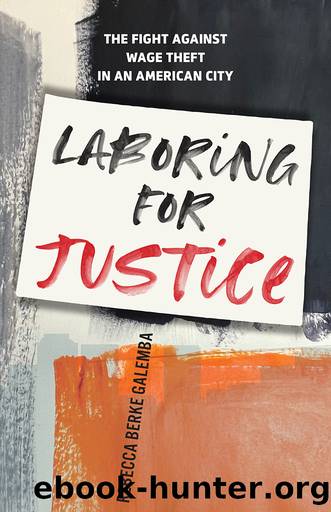Laboring for Justice by Rebecca Berke Galemba;

Author:Rebecca Berke Galemba;
Language: eng
Format: epub
Publisher: Stanford University Press
Published: 2023-06-15T00:00:00+00:00
Staff at the CDLE, as well as many judges, have workersâ best interests in mind. Some investigators go to great lengths to investigate and creatively reconstruct cases with scant records, but others may summarily dismiss cases when they fail to fall within specified parameters even if there could still be a violation. Educating workers, compliance investigators, and judges, as well as removing barriers to make claims forms and systems easier to use and more accessible, are important steps. However, absent more proactive strides and sufficient political will and resources, legal education falls short of addressing how state bureaucracies are embedded in, and reproductive of, the larger sociolegal system that remains silent on the rise of precarious employment and excludes undocumented workers from legal protections while enacting more proactive punitive governance over their daily lives. The supposedly objective and technical legal work of courts and legal agencies operates to preserve the marginal structural position of low-wage immigrant workers, which concentrates them in precarious work that is prone to labor violations and underprotected by labor laws.73
Even if workers recover their money, there is no guarantee that their employer will not do the same to others or that they will not suffer again.74 Day laborers grasp the limits of laws that have rarely protected low-wage, immigrant, and racialized workers but have instead policed them.75 Yet they are guided to seek recourse from a legal system that through its other manifestations otherwise surveils and threatens to remove them.76 Until 2016, the CDLE was also tasked with enforcing the Colorado Employment Verification Law, which doubled up on federal efforts by requiring employers to âcomplete an affirmation of legal work status.â77 The limited ways the law offers to help immigrant workers by encouraging them to help themselves and the humiliating requirements it requests in order to do so reveal how legal violence inflicts systemic forms of suffering.78
As the CDLE moves toward a more proactive approach, its outreach efforts and strong relationships with nonprofits, unions, and worker centers that workers trust will be key to investigating violators, coenforcing the law, and convincing workers that government agencies care or at least are trying to help within their limitations.79 Yet well-intentioned advocates and enforcement agencies should also consider the limits of legal and regulatory fixes to contend with the sociostructural problems that continue to incentivize legal and illegal types of workplace exploitation: the proliferation of nonstandard work arrangements, escalating inequality, and the pervasiveness of immigration fear that continue to leave more workers underprotected and wary.80
These challenges do not mean that workers do nothing to contest wage theft, but they do put in perspective the dynamics of the next chapter: why some workers may place more faith in God or alternative forms of justice than the magic required to believe that the legal system will somehow summon vanished wages.
Download
This site does not store any files on its server. We only index and link to content provided by other sites. Please contact the content providers to delete copyright contents if any and email us, we'll remove relevant links or contents immediately.
The Social Psychology of Inequality by Unknown(2313)
The Plant Paradox by Dr. Steven R. Gundry M.D(2047)
The Writing on the Wall by Anselm Jappe(1761)
Working for Yourself by J.D. (Nolo) Stephen Fishman(1480)
Every Landlord's Legal Guide by Janet Portman & Stewart Marcia & Ralph Warner(1329)
The First 20 Hours: How to Learn Anything ... Fast by Kaufman Josh(1308)
ADHD on Trial by Michael Gordon(1242)
Decisive by Chip Heath(1202)
Drafting Contracts: How and Why Lawyers Do What They Do, Second Edition by Stark Tina L(1175)
Working for Yourself by Stephen Fishman J.D. (Nolo)(1141)
The Economist Aug 8th 2015 by The Economist(1124)
Restitution by Restitution(1116)
The Economist Aug 29th 2015 by The Economist(1099)
A Practical Guide to International Arbitration in London by Hilary Heilbron(1085)
The Lord of the Rings: The Fellowship of the Ring, the Two Towers, the Return of the King by J. R. R. Tolkien(1084)
Intellectual Property Strategy by John Palfrey(1083)
Collusion by Luke Harding(1046)
Persuasion by Owner(1018)
Chapter 1 by Owner(952)
